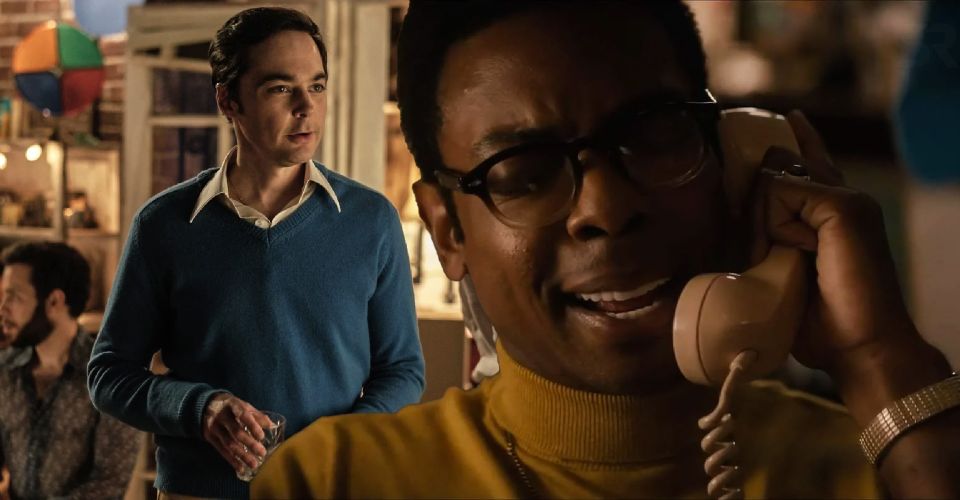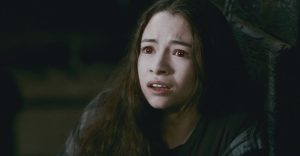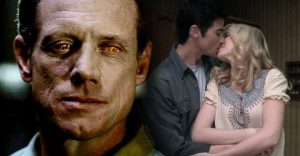The Boys in the Band: What Each Of The Phone Calls Means

The Boys in the Band includes an extended phone call sequence, so what do the conversations reveal about the focal characters? On the surface, the party “game” brings the characters together and theoretically allow for group catharsis, but the calls also further develop the character arcs for numerous individuals. The Boys in the Band conversations are laced with double-meanings and build to climactic revelations.
Directed by Joe Mantello and based on Mart Crowley’s eponymous 1968 play, The Boys in the Band primarily takes place in a Manhattan apartment. A group of gay friends assemble at the the home of roommates Michael (Jim Parsons) and Donald (Matt Bomer) to celebrate the birthday of Harold (Zachary Quinto). After conversing about life and love in The Big Apple, the gathering is interrupted by the arrival of Michael’s former Georgetown classmate, Alan (Brian Hutchinson), who appears to be dealing with a personal problem and doesn’t seem to understand that partygoers like Larry (Andrew Rannells), Hank (Tuc Watkins), and Bernard (Michael Benjamin Washington) are all gay. However, Alan does identify Emory (Robin de Jesús) as a “pansy,” which leads to a violent encounter. Despite all the drama, Alan is allowed to stay at the party, and it becomes evident that he doesn’t actually want to leave. The Boys in the Band‘s main cast reprises their roles from a 2018 Broadway production.
“Game time” begins in The Boys in the Band on Netflix when the main group assembles inside due to rain. Alan emerges from the upstairs bathroom and plans to leave, but Michael passive-aggressively confronts him and suggests that he showed up for a specific reason. Michael compares Alan’s rattled demeanor to someone observing a highway accident, stating “You can’t look at it, and you can’t look away.” And so the game begins. Per Michael’s rules, the participants must call one person that they truly once loved. There’s one point awarded for making the call, two more points if the person in question actually answers, and another point if someone else answers. Michael also states that two points are awarded to the caller for identifying themselves, and five bonus points are received if the caller expresses their love. Here’s the true meaning of each party game conversation in The Boys in the Band on Netflix.
Bernard

Before Bernard makes his decision about who to call in The Boys in the Band on Netflix, Emory is one step ahead by suggesting that he wants to call Peter Dahlbeck. Bernard confirms that he’s right, and explains how he and his mother used to work for the Dahlbeck family in Detroit. “I think I’ve loved him all my life,” Bernard says, before admitting that he and the allegedly-straight Peter hooked up after a drunken swimming party. The two later swam together in the nude, and Peter acted like nothing happened the following morning.
Bernard is ultimately disappointed by his two-point phone call. He initially plans to reconnect with Peter, and knows that his former crush has separated from his third wife. On the phone, though, Bernard fails to admit his true feelings while speaking with Peter’s mother. Michael urges him on, yet Bernard plays it nice and states that he’s sorry to hear about Peter’s marital issues. “Why did I call?” Bernard says while reflecting about his past memories. The Boys in the Band on Netflix reveals that Bernard still can’t stand up for himself as a grown man, and seems to find solace in nostalgic memories. Whereas many of his friends are loud and proud, Bernard seemingly feels trapped by societal pressures as a gay Black man in late ’60s America.
Emory

In The Boys in the Band on Netflix, Emory’s call begins with a sense of idealism and ends with a reminder about his self-medicating behavior. Before dialing, Emory fondly recalls his crush on Bronx native Delbert Botts, a man seven years his senior. “I’ve loved him ever since the first day I laid eyes on him,” Emory says while dating his crush all the way back to the fifth grade. Several years later, Emory tracked down Delbert – now a dentist – and arranged for a teeth cleaning. He explained that he’d be creating a celestial theme for the junior-senior prom, and later requested to be friends with Delbert. After buying the dentist a gold-plated cigarette lighter, Emory came to realize that Delbert’s fiancee and her friends knew all about the “funny little secret.” Bernard urges Emory not to make the call, which ignites a discussion about race and ego.
Prior to the call, Michael criticizes Bernard for allowing Emory to make “Uncle Tom” comments about him. In response, Bernard claims that he only goes along with the insults to make Emory feel content. In this moment, Emory identifies himself as a “major drunk” and apologizes to Bernard. He’s also called a “Nellie coward” by Michael, which precedes the phone call to Dr. Delbert. N0w faced with an opportunity to be himself, Emory once again retreats into idealism and nostalgia during the moment, and quickly realizes that his crush hung up the phone. Emory takes the lead with three points in the Netflix movie, but seems to realize that he’s unable to truly be himself, as he fantasizes about what could be and then drinks alcohol to mask his true feelings. Harold pinpoints Emory’s frame of mind by questioning if he’s still having fun.
Hank

Hank’s call in The Boys in the Band doesn’t last long, but it sparks a conversation about the nature of his relationship with Larry. In fact, Larry initially plans to call “Charlie” – a name that’s used to describe all of his cheating partners. Hank ends up surprising his roommate/lover by calling his messaging service and announcing that he wants to leave a special message for Larry: “I love you.” So, Hank outs himself with the seven-point call in the Netflix movie, and also explains his life journey to a rather confused Alan. Hank reveals that he’s no longer worried about his sexuality, and recalls the moment when he first acted out on his urges by picking up a man at Grand Central Station (while married). Hank’s call shows that he now feels free to be himself, and the subtext implies that Alan has questions about his own sexuality. Hank and several other gay men in the room state that they “always” knew about their same-sex attractions.
Hank’s call in The Boys in the Band on Netflix forces Larry to confront the truth about their relationship. “Numerous relations is a part of the way I am,” Rannells’ character states before acknowledging that one of his “single-side attractions” involved Michael’s roommate, Donald. Larry declaratively states to Hank that he wants to be with him, but also wants to have sexual flings with other men. Overall, the conversation suggests that Hank is the adult in the relationship, and that Larry is scared to commit because he doesn’t want to complicate his lifestyle. The rest of the characters in the Netflix film watch as Larry picks up the phone and plots his next move.
Larry

Larry’s call is short and sweet. In The Boys in the Band, he calls Hank at Michael and Donald’s home, and then expresses his love while standing just a few feet away from his partner. “I’ll… I’ll try,” Hank says, and Larry responds with, “I will, too.” Just like that, the couple resolves their conflict, if only briefly. Larry takes the lead with a 10-point call, prompting Harold to say, “Well, that wasn’t as much fun as I thought it would be.”
For Larry, the call highlights his emotional intelligence. He initially rejects Hank’s desire to have a monogamous relationship, and seems to know that he’s simply not ready to grow up. The truth, however, is that Larry has every right to live a life that makes him happy, certainly if he’s honest about his feelings. After a moment of self-reflection, though, Larry realizes that it’s worth investing more time and effort into his primary relationship, presumably because he understands that Hank is a good man and seems ready for the next phase of his life post-marriage. The Boys in the Band later shows Larry leaving the “game” to spend some up-close-and-personal time with his lover, Hank.
Alan

After Larry’s 10-point call in The Boys in the Band, Michael aggressively urges Alan to participate in the “game.” He’s not genuinely curious about whom his college friend may call, but rather wants to out Alan as a “closet queen,” or a gay man pretending to be straight. From Michael’s perspective, he’s upset about Alan’s homophobic behavior and knows that his college pal once had a sexual relationship with a classmate named Justin Stewart. They apparently had “several” sexual encounters, and – according to Michael – Alan “dropped” Justin upon realizing that he was indeed gay. The entire conversation between Michael and Alan is preceded by Harold’s telling statement that Michael won’t actually participate in the game because he’s never loved anyone. Because of that inner angst, Michael tries to find emotional relief by essentially bullying Alan into admitting that he’s gay.
Michael actually makes the phone call to Justin, but Alan steps in and takes control of the moment. Initially, it seems like he’s revealing his love to Justin, when in fact he’s calling his wife Fran because she’s the person that he truly loves. The Boys in the Band on Netflix implies that Alan is indeed a closeted gay man who’s not ready to accept his sexuality, but he can be that person and still have genuine feelings for his wife, of course. The inherent conflict is that Michael wants to expose Alan, who could’ve left the party at any moment. Alan stays because he appears to be genuinely curious about the collective conversations, which seems to imply that he’s maybe confused about being bi-sexual.
In a Netflix film that’s essentially about the wants and needs of several gay men, Alan is the outlier because he’s still figuring out his sexuality. And that’s OK. By the end, Alan appears to better understand himself before leaving. “Thank you, Michael,” he says, as he exits and sets off on a new journey. After all, Alan’s wife Fran may be curious about the “Justin” that Michael references when he swipes the phone away from his college roommate and speaks for him. Once the “game” officials ends in The Boys in the Band, Michael receives a proper scolding from Harold, who describes the party host as a “sad and pathetic man,” a statement that transitions into another heavy-duty sequence about self-hate, shame, and self-destructive behavior.
About The Author


















